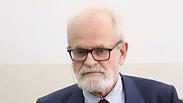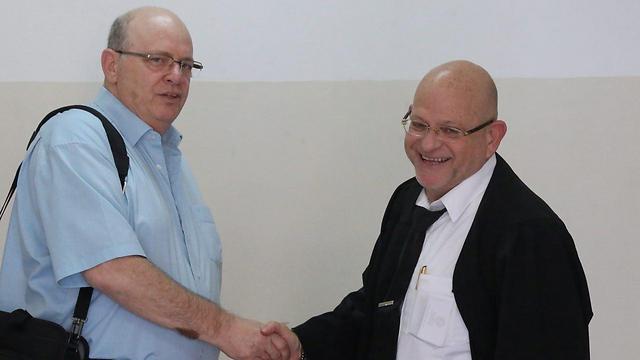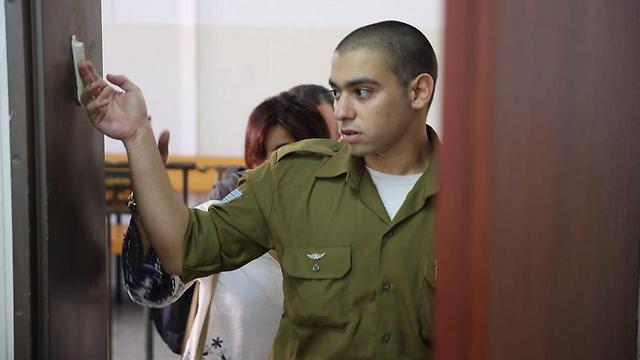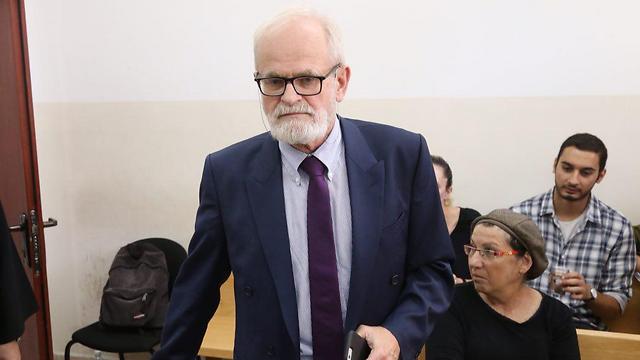
Former Abu Kabr head defends Azaria, says autopsy physician ‘imagined seeing bleeding’
After the Abu Kabir Institute for Forensic Medicine found that neutralized terrorist Abdel Fatah al-Sharif died as a result of being shot by Sgt. Elor Azaria, the institute’s former head testifies in Azaria’s trial, criticizing the autopsy and saying that ‘It was conducted improperly’; A psychiatrist who examined Azaria additionally says ‘He suffers from post trauma.’
Sgt. Elor Azaria’s trial for shooting and killing neutralized terrorist Abdel Fatah al-Sharif in Hebron last March continued on Thursday, with a new point of contention. Prof. Yehuda Hiss, the former head of the Abu Kabir Institute for Forensic Medicine, which submitted an autopsy report finding that al-Sharif was killed by Azaria’s bullets, spoke for the Defense. Hiss claimed that the autopsy was improperly carried out, and that it failed to supply key information that could affect its conclusions.
According to Hiss, the evidence supplied by Abu Kabir’s report is inconclusive so that while al-Sharif did appear to have died from being shot six times—which had caused one of his lungs to collapse as well as brain injury—Azaria was not necessarily the one who had delivered the fatal gunshot.
Hiss based his own testimony on the autopsy report written by the staff at Abu Kabir and headed by Dr. Gibbs, with the Defense claiming that it was not given the opportunity to examine the body.
When asked whether al-Sharif died as a result of an embolism, he answered that he did. “There were no head injuries that would indicate (a cause of) death,” said Hiss, who rejected the notion that al-Sharif died due to a bullet entering his brain. Hiss also criticized the lack of laboratory work that would have been of use in determining what had actually happened.
Hiss also refuted Dr. Gibbs’ stating that bleeding had occurred. “She herself understands that what she wrote in her conclusions is not right. It is possible that Dr. Gibbs imagined seeing bleeding. I would have documented it correctly.”
Psychiatrist finds Azaria to be suffering from post trauma
Psychiatrist Issaschar Herman was also called upon to testify for the Defense. Prosecutor Nadav Weisman asked about certain discrepancies between Azaria’s different testimonies. Specifically, Weisman referred Herman to Azaria stating that he had read all of the previous testimonies he gave the military’s Criminal Investigation Division (CID), while telling Herman contradictory information.

Herman acknowledged that Azaria told him something different, but explained that the question to be asked here was whether Azaria gave Herman a false account of what happened, whether Azaria told him something different because he was embarrassed he could not read (a claim based on his learning disabilities), or whether he was exhausted and unable to read due to a lack of sleep.
When asked by Judge Sitbon why Herman rules out that Azaria shot al-Sharif out of a sense of vengeance, Herman replied, “My impression is that this particular soldier does not have a vindictive personality.” He elaborated on this point, describing how “I asked him whether he was mocked at school. He said that he was, but I did not detect anger or a desire to take vengeance on them. The same goes for the way he sees his company commander, who he is angry at. He talked about how he disengages, but nothing beyond that.” Instead, Herman told the court that “He suffers from posttraumatic stress disorder, and his condition will worsen as the trial goes on. This needs to be wrapped up as quickly as possible.”
During the trial meeting of the trial, Azaria’s former sergeant, Staff Sgt. T., defended him and described Azaria as “professional” and “caring,” adding that “He never expressed himself in an attacking manner against Palestinians” and that “Azaria did not behave like thug.”












